
Dame Edith Louisa Sitwell was a British poet and critic and the eldest of the three literary Sitwells. She reacted badly to her eccentric, unloving parents and lived much of her life with her governess. She never married but became passionately attached to Russian painter Pavel Tchelitchew, and her home was always open to London's poetic circle, to whom she was generous and helpful.

Harold Edward Monro was an English poet born in Brussels, Belgium. As the proprietor of the Poetry Bookshop in London, he helped many poets to bring their work before the public.

Robert Malise Bowyer Nichols was an English writer, known as a war poet of the First World War, and a playwright.
Poems of Today was a series of anthologies of poetry, almost all Anglo-Irish, produced by the English Association.
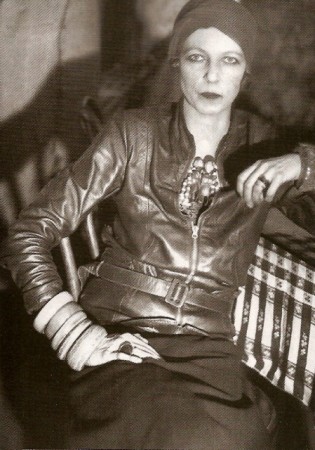
Nancy Clara Cunard was a British writer, heiress and political activist. She was born into the British upper class, and devoted much of her life to fighting racism and fascism. She became a muse to some of the 20th century's most distinguished writers and artists, including Wyndham Lewis, Aldous Huxley, Tristan Tzara, Ezra Pound and Louis Aragon—who were among her lovers—as well as Ernest Hemingway, James Joyce, Constantin Brâncuși, Langston Hughes, Man Ray and William Carlos Williams. MI5 documents reveal that she was involved with Indian diplomat, orator, and statesman V. K. Krishna Menon.
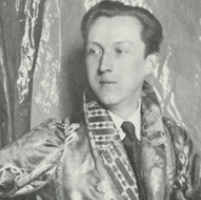
Sir Sacheverell Reresby Sitwell, 6th Baronet, was an English writer, particularly on baroque architecture, and an art and music critic. Sitwell produced some 50 volumes of poetry and some 50 works on art, music, architecture, and travel.
Iris Tree was an English poet, actress, and art model, described as a bohemian, an eccentric, a wit, and an adventurer.

Walter Sherard Vines (1890–1974), known as Sherard Vines, was an English author and academic. He began publishing poetry in the 1910s, then in the 1920s spent five years teaching at Keio University in Tokyo, Japan. While in Japan and after his return to England, where he took up a post at University College Hull, he continued to publish poetry, fiction and criticism. His works include The Course of English Classicism from the Tudor to Victorian Age (1930), a study of classicism in British art; Yofuku, or, Japan in Trousers (1931), a travel book about his experiences in Japan which was critical of aspects of Japanese culture; and A Hundred Years of English Literature (1959), a survey of the literature of Britain, the British Empire and the United States.

Sir Francis Osbert Sacheverell Sitwell, 5th Baronet CH CBE was an English writer. His elder sister was Edith Sitwell and his younger brother was Sacheverell Sitwell. Like them, he devoted his life to art and literature.
John George Pearson was an English novelist and an author of biographies, notably of Ian Fleming, of the Sitwells, and of the Kray twins.
Stephen Hudson is a pseudonym of the British novelist and translator Sydney Schiff, whose work was published in the 1910s, 1920s, and 1930s. With a substantial income from his commercially successful family, Schiff was a patron of the arts, with friendships in the musical, artistic and literary circles of England and France.

Sir George Reresby Sitwell, 4th Baronet was a British antiquarian writer and Conservative politician who sat in the House of Commons between 1885 and 1895.
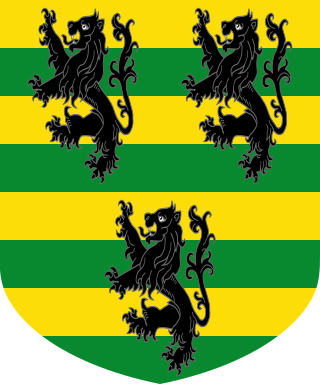
The Sitwell Baronetcy, of Renishaw in the County of Derby, is a title in the Baronetage of the United Kingdom. It was created on 3 October 1808 for Sitwell Sitwell, Member of Parliament for West Looe. The Sitwell family had been ironmasters and landowners in Eckington, Derbyshire, for many centuries.
Nationality words link to articles with information on the nation's poetry or literature.
Literary Taste: How to Form it is a long essay by Arnold Bennett, first published in 1909, with a revised edition by his friend Frank Swinnerton appearing in 1937. It includes a long list of recommended books, every item individually costed.

William Henry Forester Denison, 1st Earl of Londesborough, known as The Lord Londesborough from 1860 to 1887, was a British peer and Liberal politician. He was also one of the main founders of Scarborough FC.
Henderson's, better known as The Bomb Shop, was a bookshop at 66 Charing Cross Road, London known for publishing and selling both radical left and anarchist writing and modernist literature. The shop was founded in 1909, and was a father and son operation run by Francis Riddell Henderson, formerly the London representative of Walter Scott Publishing. The shop was bought by Eva Collet Reckitt, and became the first of the Collet's chain of left-wing bookshops.
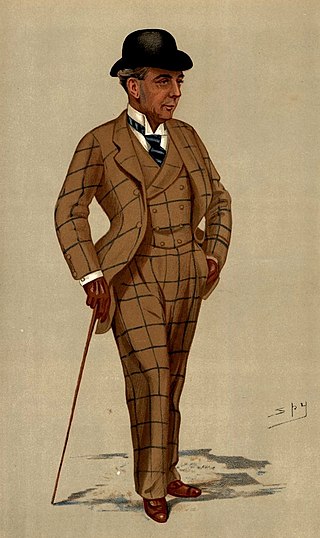
Thomas Anthony Hwfa Williams (1849/50–1926) was a British Army officer and racecourse manager. A figure of the Marlborough House Set, he was a close associate of the future King Edward VII, and his wife Mrs. Hwfa Williams a leader of the fashionable world.
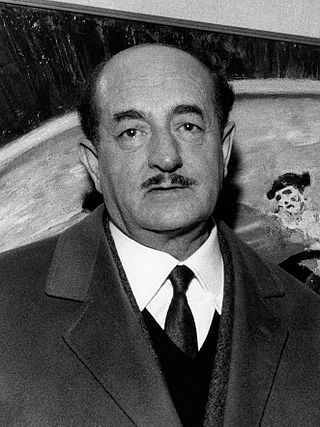
The 1959 Nobel Prize in Literature was awarded to the Italian poet Salvatore Quasimodo (1901–1968) "for his lyrical poetry, which with classical fire expresses the tragic experience of life in our own times" He is the fourth Italian recipient of the said prize.
Left Hand, Right Hand! is an autobiography in five volumes by the English poet and man of letters Osbert Sitwell. It relates in opulent detail the story of the author's early life in relation to his ancestors, his immediate family, especially his father Sir George Sitwell, and the fashionable and artistic world of his time. The five volumes are: Left Hand, Right Hand! (1944), re-titled in some editions The Cruel Month, about his ancestry and early childhood; The Scarlet Tree (1945), about his education at Eton and his first experiences of Italy; Great Morning (1947), about his boyhood and his peacetime service as an army officer; Laughter in the Next Room (1948), about his career after the First World War as a writer; and Noble Essences (1950), about his many notable friends. A sixth volume, Tales My Father Taught Me (1962), which was not formally included in the sequence, relates a number of further anecdotes about Sir George. Left Hand, Right Hand! has been acclaimed by both critics and readers from its first publication up to the present century, and is widely recognized as Sitwell's greatest work.













